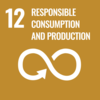The issue: Globally, about 30% of vegetable oil is sourced from palm oil, but expansion of oil palm plantations is causing widespread deforestation, resulting in substantial losses of biodiversity, and releasing huge quantities of CO2. Concerns about these detrimental environmental impacts led to the Roundtable on Sustainable Palm Oil (RSPO) being set up as the main voluntary sustainability certification body for palm oil. The UK has committed to sourcing sustainable palm oil and removing deforestation from supply chains.
Research at York has contributed to zero-deforestation policies adopted by members of the leading global sustainable palm oil certification organisation, the RSPO, securing the protection of ~790,000ha of rainforest to-date. We have helped improve the RSPO sustainability criteria which require the protection of patches of rainforest on plantations. Our research has fed into policy on the RSPO’s High Conservation Values and High Carbon Stocks policies, which are employed across large parts of the tropics, conserving biodiversity (contributing to protecting ~70% of rainforest species) and reducing carbon emissions (by 1.4m t CO2 equivalent in emissions per year).
Annual carbon savings achieved with the initiative:


